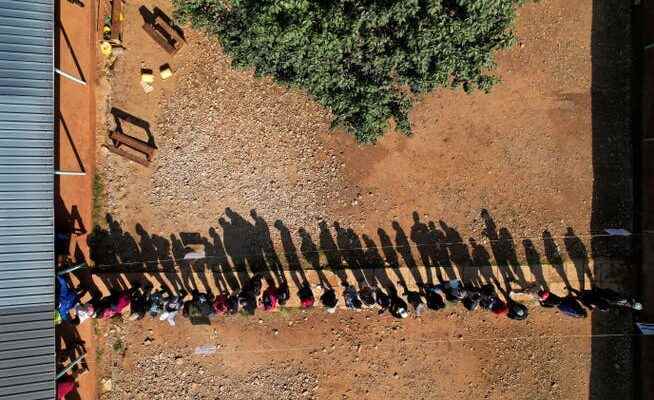Belief in the power of renewal of the political system was shattered in Kenya even before the elections. After the last few weeks, even more people in the East African country are likely to ask themselves: why vote at all?
Queuing in front of the polling station – this time, a third of those entitled to vote stayed at home on decision day.
These are remarkable words that William Ruto addressed to his people on Monday. “There are no losers in this election,” Kenya’s new president said shortly after the results were announced. “The Kenyan people won.”
For runner-up Raila Odinga, who has now lost a presidential election for the fifth time, that might sound like mockery.
The words are remarkable above all because after the events of the last few weeks in Kenya there is an even more significant loser: democracy.
Voter turnout has plummeted
Already during the election campaign it became apparent that the belief in the power of renewal of the political system in Kenya was low. It is true that pictures of election events repeatedly showed large crowds. But media reports soon revealed that it was at least partly staged.
Many of the men and women crowded in front of a stage with party-colored flags and T-shirts were not there because they believed in the candidates and their promises. They only came because they got a few dollars for it.
Young Kenyans in particular showed less interest in these elections than in previous years. This is not due to a general disenchantment with politics. It’s up to the candidates themselves. Ruto and Odinga have been part of the country’s political elite for decades. They were vice-presidents, ministers, MPs. They are therefore partly responsible for the fact that the country is in a deep economic crisis today.
Many in Kenya would have wished for real change from this election. But it wasn’t on the ballot. In many respects, Ruto and Odinga stand for the exact opposite of this: for the preservation of the status quo and for a political elite that reproduces itself in an endless loop
Quite a few therefore see the ballot as essentially an election without a real choice. The logical consequence: Many stayed at home on the day of the decision; only 65 percent of those entitled cast their votes. That’s a worrying drop compared to 2017, when turnout was 80 percent.
Only 17 percent trust the electoral commission
What happened in the last few days may have encouraged many of those who stayed at home in their decision.
First the almost incomprehensible, days of waiting for the results. Then the chaotic hours on Monday afternoon: Shortly before the final results were announced, four of the seven commissioners of the election commission appeared before the press. They could not accept the results because of the “opaque” vote count, they say. Before the Commission President declared Ruto the winner shortly thereafter, there was a riot in the room and a police operation.
Such scenes stick. And they cover up the fact that there has definitely been progress: a more transparent electoral system, for example. Or the fact that voters were less oriented towards the ethnicity of the candidates than in the past.
The behavior of the electoral commission could prove to be particularly damaging to Kenyan democracy. Their internal division is poison for trust in the political system – regardless of what the so far incomprehensible accusation of the four renegades is about.
Because one thing is clear: the commission is of outstanding importance in elections. As an independent arbitrator, she must be impartial, incorruptible, transparent and fair. It must guarantee that the rules of the game are observed. This is the only way to create trust in the official election results – and thus in democracy.
Even before these elections, many people in Kenya harbored considerable doubts as to whether the body would meet these criteria. According to a survey from 2019, only 17 percent of the population have full confidence in the electoral commission. This catastrophic value is likely to have fallen even further as a result of the recent dislocations.
It is therefore to be feared that in the future even more people in Kenya will ask themselves whether going to the ballot box is worthwhile. And that before the next elections many will come to a similarly fatalistic conclusion as a young Kenyan said on the radio last week: «The search for political change in Kenya is like searching for gold in the sea. She’s hopeless.”
